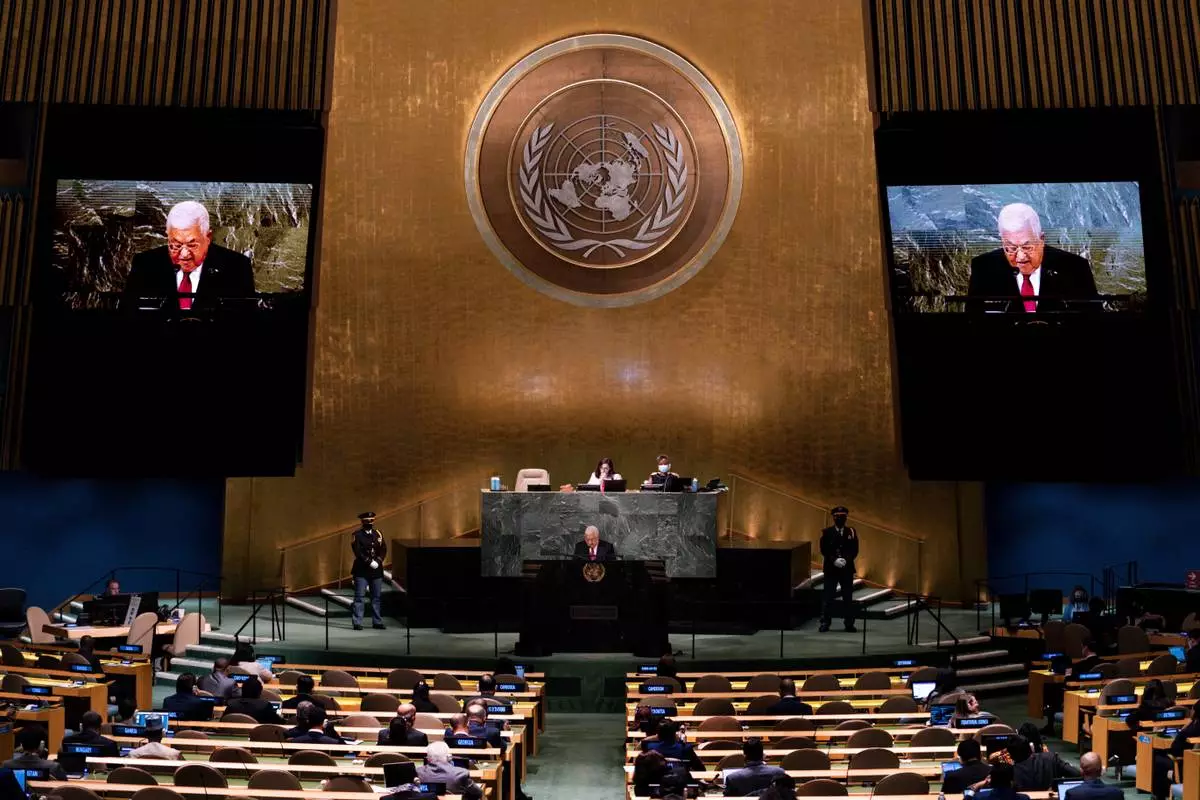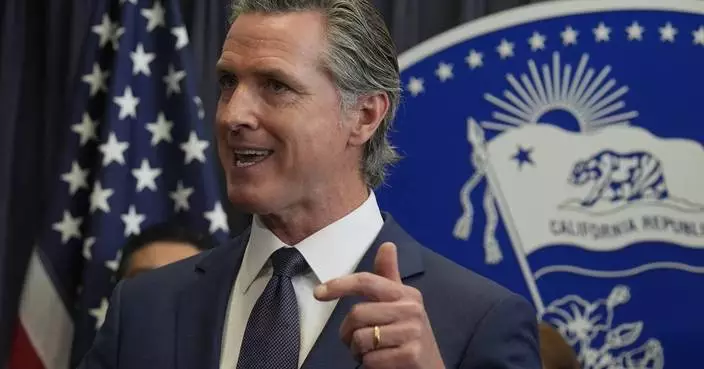Barbara Myers started work as an apprentice electrician in 1995, and over the years she learned to shoot back sexual banter on the job site as much as she had to take it from some of her coworkers.
Those days, she says, are starting to change.
"I have worked over the last several years, actually, to really be much more circumspect in my conversation," Myers said. "And so, basically, I don't talk about things like that. And I know a lot of the guys are the same way."
Myers is among the roughly one-third of American workers who say they've changed how they act at work in the past year, as the #MeToo movement has focused the nation's attention on sexual misconduct and highlighted issues of racial and ethnic diversity at the same time, according to a new poll of Americans who are full- or part-time employees.
The survey, conducted by The Associated Press-NORC Center for Public Affairs Research in collaboration with the software company SAP, also found that about a third of all working adults say they have talked about sexual misconduct in the workplace with coworkers in the past year.
"I have worked construction. And I grew up during that time period, where banter of that type was much more free," Myers said. "I have had to watch what I say. ... If I find that it would be offensive to a woman, I know that there are men that are just as sensitive."
The poll finds American workers view the #MeToo movement more favorably than unfavorably, 45% versus 27%. Half of women had a favorable opinion, compared with 4 in 10 men; just over 3 in 10 men view the movement unfavorably.
Those who say they have been subjected to workplace sexual misconduct are especially likely to view the movement favorably, compared with of those who say they have not been victims of misconduct, 60% versus 42%.
About half of working adults think things will change for the better for working women in general as a result of the recent high-profile sexual misconduct cases. And as a result of recent focus on issues of racial and ethnic diversity, about 4 in 10 working adults think change for the better is likely for African Americans, while about a third say the same for workers of Hispanic origin.
Still, the poll found that few Americans expect positive change will come to their own workplace or for them personally. Count ShaeTiaunna Green, 26, a cashier from Wyoming, Michigan, among them.
Green, who is African American and a lesbian, said she's hoping for positive change, but she's not optimistic.
Still, she said she has thrived in diverse workplaces, so when she applied for her current job at a supermarket last year, she made sure it was diverse and had inclusive policies. The poll finds that diversity and inclusion policies are much more important to black and Hispanic workers than to white workers and are slightly more important to women than to men.
"I wanted to make sure that was an aspect, and so that I knew that everyone had an equal opportunity and I wouldn't be excluded from certain opportunities," she said.
About 4 in 10 working Americans say their employer has established new training on harassment in the workplace, instituted new policies about harassment or introduced new training on workplace diversity in the last two years. Most of those who say their workplace has made any of those changes think it's had a positive impact.
Jason Phillips, 49, works for Seattle and said employees receive ongoing diversity training that he believes has had a positive effect on his workplace, allowing people to advance their understanding of issues of race and equity.
"We're all on a different point in that spectrum," he said. "And so, it provides everyone all these different opportunities to advance their awareness wherever they are on that spectrum."
In assessing their own workplaces, about 4 in 10 working adults say white people and men experience more advantages compared with others, while about half don't think they are more or less advantaged, according to the poll.
Robin Knight, a 58-year-old dental technician from Brooklyn, said that when it comes to pay, men often have the advantage, even though she thinks in her female-dominated field, women often have an edge in getting hired.
"For some reason, if a man is writing a check, he'll write more to his own counterpart than to us, and I don't know why," she said.
The poll also shows that people who supervise at least one employee are more likely than non-supervisors to say they have talked with coworkers about sexual misconduct in the workplace in the last year, 41% to 23%, and that they've changed how they interact with coworkers, 38% to 27%.
Tom Eisenhauer, 65, of Pocatello, Idaho, manages apartment complexes and oversees 25 to 30 people. His workers often must handle difficult situations with tenants, and he said women in the industry can face harassment and discrimination from tenants and coworkers. Hispanic workers are often pigeonholed by others, with people assuming they are janitors or pool cleaners.
"They have to disprove the stereotype, even to somebody like me who's more liberal," said Eisenhauer, who is white.
He added: "All the horrible traps that we fall into, you know, we all do it. I'm as guilty as anybody."
The AP-NORC Center survey of full- and part-time employees was conducted by The Associated Press-NORC Center for Public Affairs Research with funding from SAP. It was conducted July 25-30 using a sample drawn from NORC's probability-based AmeriSpeak Panel, which is designed to be representative of the U.S. population. The margin of sampling error for all respondents is plus or minus 4.2 percentage points. Respondents were first selected randomly using address-based sampling methods and later were interviewed online or by phone.
Online:
AP-NORC Center: http://www.apnorc.org
UNITED NATIONS (AP) — The U.N. General Assembly voted by a wide margin on Friday to grant new “rights and privileges” to Palestine and called on the Security Council to favorably reconsider its request to become the 194th member of the United Nations.
The 193-member world body approved the Arab and Palestinian sponsored resolution by a vote of 143-9 with 25 abstentions.
The United States vetoed a widely backed council resolution on April 18 that would have paved the way for full United Nations membership for Palestine, a goal the Palestinians have long sought and Israel has worked to prevent.
U.S. deputy ambassador Robert Wood made clear on Thursday that the Biden administration opposed the assembly resolution. The United States was among the nine countries voting against it, along with Israel.
THIS IS A BREAKING NEWS UPDATE. AP’s earlier story follows below.
UNITED NATIONS (AP) — The U.N. General Assembly is expected to vote Friday on a resolution that would grant new “rights and privileges” to Palestine and call on the Security Council to favorably reconsider its request to become the 194th member of the United Nations.
The United States vetoed a widely backed council resolution on April 18 that would have paved the way for full United Nations membership for Palestine, a goal the Palestinians have long sought and Israel has worked to prevent, and U.S. deputy ambassador Robert Wood made clear Thursday the Biden administration is opposed to the assembly resolution.
Under the U.N. Charter, prospective members of the United Nations must be “peace-loving,” and the Security Council must recommend their admission to the General Assembly for final approval. Palestine became a U.N. non-member observer state in 2012.
“We’ve been very clear from the beginning there is a process for obtaining full membership in the United Nations, and this effort by some of the Arab countries and the Palestinians is to try to go around that,” Wood said Thursday. “We have said from the beginning the best way to ensure Palestinian full membership in the U.N. is to do that through negotiations with Israel. That remains our position.”
But unlike the Security Council, there are no vetoes in the 193-member General Assembly and the resolution is expected to be approved by a large majority, according to three Western diplomats, speaking on condition of anonymity because negotiations were private.
The draft resolution “determines” that a state of Palestine is qualified for membership – dropping the original language that in the General Assembly’s judgment it is “a peace-loving state.” It therefore recommends that the Security Council reconsider its request “favorably.”
The renewed push for full Palestinian membership in the U.N. comes as the war in Gaza has put the more than 75-year-old Israeli-Palestinian conflict at center stage. At numerous council and assembly meetings, the humanitarian crisis facing the Palestinians in Gaza and the killing of more than 34,000 people in the territory, according to Gaza health officials, have generated outrage from many countries.
The original draft of the assembly resolution was changed significantly to address concerns not only by the U.S. but also by Russia and China, the diplomats said.
The first draft would have conferred on Palestine “the rights and privileges necessary to ensure its full and effective participation” in the assembly’s sessions and U.N. conferences “on equal footing with member states.” It also made no reference to whether Palestine could vote in the General Assembly.
According to the diplomats, Russia and China which are strong supporters of Palestine’s U.N. membership were concerned that granting the list of rights and privileges detailed in an annex to the resolution could set a precedent for other would-be U.N. members — with Russia concerned about Kosovo and China about Taiwan.
Under longstanding legislation by the U.S. Congress, the United States is required to cut off funding to U.N. agencies that give full membership to a Palestinian state – which could mean a cutoff in dues and voluntary contributions to the U.N. from its largest contributor.
The final draft drops the language that would put Palestine “on equal footing with member states.” And to address Chinese and Russian concerns, it would decide “on an exceptional basis and without setting a precedent” to adopt the rights and privileges in the annex.
The draft also adds a provision in the annex on the issue of voting, stating categorically: “The state of Palestine, in its capacity as an observer state, does not have the right to vote in the General Assembly or to put forward its candidature to United Nations organs.”
The final list of rights and privileges in the draft annex includes giving Palestine the right to speak on all issues not just those related to the Palestinians and Middle East, the right to propose agenda items and reply in debates, and the right to be elected as officers in the assembly’s main committees. It would give the Palestinians the right to participate in U.N. and international conferences convened by the United Nations — but it drops their “right to vote” which was in the original draft.
Palestinian President Mahmoud Abbas first delivered the Palestinian Authority’s application for U.N. membership in 2011. It failed because the Palestinians didn’t get the required minimum support of nine of the Security Council’s 15 members.
They went to the General Assembly and succeeded by more than a two-thirds majority in having their status raised from a U.N. observer to a non-member observer state. That opened the door for the Palestinian territories to join U.N. and other international organizations, including the International Criminal Court.
In the Security Council vote on April 18, the Palestinians got much more support for full U.N. membership. The vote was 12 in favor, the United Kingdom and Switzerland abstaining, and the United States voting no and vetoing the resolution.
Follow AP's coverage at https://apnews.com/hub/israel-hamas-war

FILE - Palestinian President Mahmoud Abbas addresses the 77th session of the United Nations General Assembly on Sept. 23, 2022, at the U.N. headquarters. The U.N. General Assembly is expected to vote Friday, May 10, 2024, on a resolution that would grant new “rights and privileges” to Palestine and call on the Security Council to favorably reconsider its request to become the 194th member of the United Nations. (AP Photo/Julia Nikhinson, File)










